| Listing 1 - 10 of 29 | << page >> |
Sort by
|
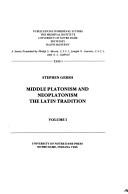
ISBN: 0268013632 9780268013639 Year: 1986 Volume: 23/1-23/2 Publisher: Notre Dame (Ind.) : University of Notre Dame Press,
Abstract | Keywords | Export | Availability | Bookmark
 Loading...
Loading...Choose an application
- Reference Manager
- EndNote
- RefWorks (Direct export to RefWorks)
History of philosophy --- anno 500-1499 --- Philosophy, Medieval --- Neoplatonism --- Philosophie médiévale --- Néo-platonisme --- Influence --- Plato --- -Philosophy, Medieval --- #GOSA:II.P.AU.1 --- #GOSA:V --- Alexandrian school --- Church history --- Hellenism --- Philosophy --- Philosophy, Ancient --- Platonists --- Theosophy --- Medieval philosophy --- Scholasticism --- -Aflāṭūn --- Aplaton --- Bolatu --- Platon, --- Platonas --- Platone --- Po-la-tʻu --- Pʻŭllatʻo --- Pʻŭllatʻon --- Pʻuratʻon --- Πλάτων --- אפלטון --- פלאטא --- פלאטאן --- פלאטו --- أفلاطون --- 柏拉圖 --- 플라톤 --- Neoplatonism. --- Philosophy, Medieval. --- Influence. --- -Influence --- Philosophie médiévale --- Néo-platonisme --- Aflāṭūn --- Platon --- Platoon --- Платон --- プラトン --- Plato - Influence --- Neoplatonism - Influence
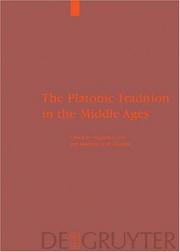
ISBN: 3110168448 3111796205 3110908492 9783110168440 Year: 2002 Publisher: Berlin: de Gruyter,
Abstract | Keywords | Export | Availability | Bookmark
 Loading...
Loading...Choose an application
- Reference Manager
- EndNote
- RefWorks (Direct export to RefWorks)
Das Handbuch beschreitet neue Wege in der Schilderung der komplexen Geschichte jener geistigen Strömungen, die gemeinhin unter der Bezeichnung 'platonisch' bzw. 'neuplatonisch' zusammengefaßt werden. Es behandelt in chronologischer Folge die bedeutendsten philosophischen Denkrichtungen innerhalb dieser Tradition. Die Beiträge untersuchen die wichtigsten platonischen Begriffe und ihre semantischen Implikationen, erläutern die mit ihnen verbundenen philosophischen und theologischen Ansprüche, legen die Quellen der Begriffe dar und stellen sie in den Kontext der auf sie rekurrierenden bzw. ihnen zuwiderlaufenden geistigen Traditionen. So entsteht ein lebhaftes Bild des intellektuellen Lebens im Mittelalter und in der Frühen Neuzeit. Das Werk enthält Beiträge in englischer und deutscher Sprache. This collection of essays delineates the history of the rather disparate intellectual tradition usually labeled as "Platonic" or "Neoplatonic". In chronological order, the book covers the most eminent philosophic schools of thought within that tradition. The most important terms of the Platonic tradition are studied together with a discussion of their semantic implications, the philosophical and theological claims associated with the terms, the sources that furnish the terms, and the intellectual traditions aligned with or opposed to them. The contributors thereby provide a vivid intellectual map of the Middle Ages and the Early Modern period. Contributions are written in English or German.
History of philosophy --- Plato --- anno 500-1499 --- Filosofie [Middeleeuwse ] --- Medieval philosophy --- Middeleeuwse filosofie --- Philosophie médiévale --- Philosophy [Medieval ] --- Platonici --- Platoniciens --- Platonism --- Platonisme --- Platonists --- Philosophy, Medieval. --- Influence. --- Academic collection --- Philosophie médiévale --- Influence --- Middle Ages. --- Dark Ages --- History, Medieval --- Medieval history --- Medieval period --- Middle Ages --- World history, Medieval --- World history --- Civilization, Medieval --- Medievalism --- Renaissance --- History
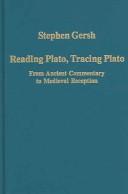
ISBN: 0860789691 9780860789697 Year: 2005 Volume: 816. Publisher: Aldershot: Ashgate,
Abstract | Keywords | Export | Availability | Bookmark
 Loading...
Loading...Choose an application
- Reference Manager
- EndNote
- RefWorks (Direct export to RefWorks)
Plato. --- Plato --- Early works to 1800. --- Aflāṭūn --- Aplaton --- Bolatu --- Platon, --- Platonas --- Platone --- Po-la-tʻu --- Pʻŭllatʻo --- Pʻŭllatʻon --- Pʻuratʻon --- Πλάτων --- אפלטון --- פלאטא --- פלאטאן --- פלאטו --- أفلاطون --- 柏拉圖 --- 플라톤 --- Platon --- Platoon --- Early works to 1800 --- Платон --- プラトン --- Plato - Early works to 1800.
Book
ISBN: 9780521198493 9781139014090 9781108465359 1108465358 0521198496 1316053318 131605568X 1316081699 1316074595 1316079333 1139014099 1316069877 1316072231 1316076962 1322176698 Year: 2014 Publisher: Cambridge Cambridge University Press
Abstract | Keywords | Export | Availability | Bookmark
 Loading...
Loading...Choose an application
- Reference Manager
- EndNote
- RefWorks (Direct export to RefWorks)
"This is the first book to provide an account of the influence of Proclus, a member of the Athenian Neoplatonic School, during more than one thousand years of European history (ca 500-1600). Proclus was the most important philosopher of late antiquity, a dominant (albeit controversial) voice in Byzantine thought, the second most influential Greek philosopher in the later western Middle Ages (after Aristotle), and a major figure (together with Plotinus) in the revival of Greek philosophy in the Renaissance. Proclus was also intensively studied in the Islamic world of the Middle Ages and was a major influence on the thought of medieval Georgia. The volume begins with a substantial essay by the editor summarizing the entire history of Proclus' reception. This is followed by the essays of more than a dozen of the world's leading authorities in the various specific areas covered"--
Proclus, --- PHILOSOPHY / History & Surveys / Ancient & Classical --- PHILOSOPHY / History et Surveys / Ancient et Classical. --- Philosophie der Antike. --- Proclus Atheniensis phil. TLG 4036. --- Proclus --- Proclo, --- Proclo di Atene, --- Proclo di Costantinopoli, --- Proclo Licio Diadoco, --- Proclus Arabus, --- Proclus Diadochus --- Proclus Diadochus, --- Proclus Lycius, --- Prokl, --- Prokl Diadokh, --- Proklos, --- Proklos Diadochos, --- Proklus, --- Πρόκλος, --- Πρόκλος Πλατωνικός Διάδοχος, --- Πρόκλος Διάδοχος, --- פרוקלוס --- Proclus, - approximately 410-485
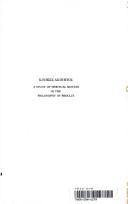
ISBN: 9004037845 9004320474 9789004037847 9789004320475 Year: 1973 Volume: 26 Publisher: Leiden, Brill
Abstract | Keywords | Export | Availability | Bookmark
 Loading...
Loading...Choose an application
- Reference Manager
- EndNote
- RefWorks (Direct export to RefWorks)
Motion --- Neoplatonism --- Mouvement --- Néo-platonisme --- Proclus, --- Kinetics --- Dynamics --- Physics --- Kinematics --- Proclus --- Motion. --- Proclus. --- Néo-platonisme --- Proclo, --- Proclo di Atene, --- Proclo di Costantinopoli, --- Proclo Licio Diadoco, --- Proclus Arabus, --- Proclus Diadochus --- Proclus Diadochus, --- Proclus Lycius, --- Prokl, --- Prokl Diadokh, --- Proklos, --- Proklos Diadochos, --- Proklus, --- Πρόκλος, --- Πρόκλος Πλατωνικός Διάδοχος, --- Πρόκλος Διάδοχος, --- פרוקלוס --- Proclus, - approximately 410-485
Book
ISBN: 9789004261402 9789004261648 9004261648 130621016X 9781306210164 9004261400 Year: 2014 Publisher: Boston Brill
Abstract | Keywords | Export | Availability | Bookmark
 Loading...
Loading...Choose an application
- Reference Manager
- EndNote
- RefWorks (Direct export to RefWorks)
Having now benefited from viable editions and studies of many of the most important authors within the Neoplatonic tradition of western philosophy, it is time for us to read these materials more actively in terms of the philosophical developments of the late twentieth century that provide the greatest opportunities for intertextual exploration. The hermeneutical project that beckons was begun in Stephen Gersh's Neoplatonism after Derrida: Parallelograms (Brill, 2006) and is raised to a higher power in his present volume. Here a new course is charted in the reading of such ancient authors as Proclus, Damascius, Augustine, Pseudo-Dionysius, and Meister Eckhart through a critical engagement with the deconstructions of pagan and Christian Neoplatonic texts in the writings of Jacques Derrida.
Neoplatonism. --- Néo-platonisme --- Derrida, Jacques. --- Alexandrian school --- Church history --- Hellenism --- Philosophy --- Philosophy, Ancient --- Platonists --- Theosophy --- Derrida, Jacques --- Derrida, J. --- Derida, Žak --- Derrida, Jackes --- Derrida, Zhak --- Deridah, Z'aḳ --- Deridā, Jāka --- Dirīdā, Jāk --- Деррида, Жак --- דרידה, ז'אק
Book
ISBN: 9781108415286 9781108401135 9781108233019 Year: 2019 Publisher: Cambridge Cambridge University Press
Abstract | Keywords | Export | Availability | Bookmark
 Loading...
Loading...Choose an application
- Reference Manager
- EndNote
- RefWorks (Direct export to RefWorks)
"The extensive influence of Plotinus, the third-century founder of "Neoplatonism," on intellectual thought from the Renaissance to the modern era has never been systematically explored. This collection of new essays fills the gap in the scholarship, thereby casting a spotlight on a current of intellectual history that is inherently significant. The essays take the form of a series of case-studies on major figures in the history of Neoplatonism, ranging from Marsilio Ficino to Henri-Louis Bergson and moving through Italian, French, English, and German philosophical traditions. They bring clarity to the terms "Platonism" and "Neoplatonism," which are frequently invoked by historians but often only partially understood, and provide fresh perspectives on well-known issues including the rise of "mechanical philosophy" in the sixteenth century and the relation between philosophy and Romanticism in the nineteenth century. The volume will be important for readers interested in the history of thought in the early-modern and modern ages. Stephen Gersh is Emeritus Professor of Medieval Studies and Philosophy at the University of Notre Dame. He has published many books on authors from Cicero to Derrida, including medieval Latin and Byzantine writers"--
Platonists. --- Neoplatonism. --- Plotinus --- Influence.
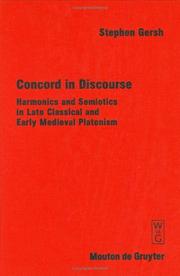
ISBN: 3110146843 9783110819182 311081918X 9783110146844 Year: 1996 Volume: 125 Publisher: Berlin New York Mouton de Gruyter
Abstract | Keywords | Export | Availability | Bookmark
 Loading...
Loading...Choose an application
- Reference Manager
- EndNote
- RefWorks (Direct export to RefWorks)
Semiotics. --- Discourse analysis. --- Language and languages --- Order (Philosophy) --- Harmony (Philosophy) --- Philosophy, Medieval. --- Philosophy, Ancient. --- Neoplatonism. --- Philosophy. --- Semiotics --- Discourse analysis --- Sémiotique --- Analyse du discours --- Langage et langues --- Ordre (Philosophie) --- Harmonie (Philosophie) --- Néo-platonisme --- History --- History. --- Philosophy --- Histoire --- Philosophie --- Neoplatonism --- Philosophy, Ancient --- Philosophy, Medieval --- Ancient philosophy --- Greek philosophy --- Philosophy, Greek --- Philosophy, Roman --- Roman philosophy --- Semeiotics --- Semiology (Linguistics) --- Semantics --- Signs and symbols --- Structuralism (Literary analysis) --- Alexandrian school --- Church history --- Hellenism --- Platonists --- Theosophy --- Discourse grammar --- Text grammar --- Medieval philosophy --- Scholasticism --- Language and languages - Philosophy.
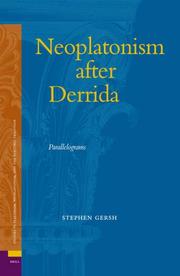
ISBN: 9004151559 9786611399320 1281399329 9047409698 9789047409694 9781281399328 6611399321 9789004151550 Year: 2006 Publisher: Leiden Boston Brill
Abstract | Keywords | Export | Availability | Bookmark
 Loading...
Loading...Choose an application
- Reference Manager
- EndNote
- RefWorks (Direct export to RefWorks)
This volume deals with the relation between Jacques Derrida's writing and Neoplatonism (ancient, patristic, medieval). Starting from the undeniable fact of Derrida's continuous engagement with this tradition, the present study deals not only with the actual reading of the Neoplatonists by Derrida ("Derrida after Neoplatonism") but also with a hypothetical reading of Derrida by Neoplatonism ("Neoplatonism after Derrida"). Thus, the intended audience is both philologists and philosophers interested in the encounter of ancient and contemporary thought. Separate chapters are devoted to a general study of Neoplatonism and Deconstruction, commentaries on three Derridean texts in which their 'Neoplatonic' implications are developed, and a treatment of the problem of non-discursive thought in which all Neoplatonic and Derridean perspectives are transcended.
Derrida, Jacques --- Neoplatonism --- Alexandrian school --- Church history --- Hellenism --- Philosophy --- Philosophy, Ancient --- Platonists --- Theosophy --- Derrida, Jacques. --- Derrida, J. --- Derida, Žak --- Derrida, Jackes --- Derrida, Zhak --- Deridah, Z'aḳ --- Deridā, Jāka --- Dirīdā, Jāk --- Деррида, Жак --- דרידה, ז'אק --- Neoplatonism.
Book
ISBN: 1108246338 1108233015 1108415288 1108244629 9781108233019 9781108415286 9781108401135 9781108246330 1108401139 Year: 2019 Publisher: Cambridge, UK New York, NY
Abstract | Keywords | Export | Availability | Bookmark
 Loading...
Loading...Choose an application
- Reference Manager
- EndNote
- RefWorks (Direct export to RefWorks)
The extensive influence of Plotinus, the third-century founder of 'Neoplatonism', on intellectual thought from the Renaissance to the modern era has never been systematically explored. This collection of new essays fills the gap in the scholarship, thereby casting a spotlight on a current of intellectual history that is inherently significant. The essays take the form of a series of case-studies on major figures in the history of Neoplatonism, ranging from Marsilio Ficino to Henri-Louis Bergson and moving through Italian, French, English, and German philosophical traditions. They bring clarity to the terms 'Platonism' and 'Neoplatonism', which are frequently invoked by historians but often only partially understood, and provide fresh perspectives on well-known issues including the rise of 'mechanical philosophy' in the sixteenth century and the relation between philosophy and Romanticism in the nineteenth century. The volume will be important for readers interested in the history of thought in the early-modern and modern ages.
Platonists. --- Neoplatonism. --- Alexandrian school --- Church history --- Hellenism --- Philosophy --- Philosophy, Ancient --- Platonists --- Theosophy --- Platonism --- Philosophers --- Plotinus --- Plotin --- Plotinos --- Influence. --- Boluoding --- Iflūṭīn --- Plotino --- Plōtinos --- Plotinus, --- Plotyn --- Πλωτι̂νος --- פלוטינוס --- أفلوطين --- Neoplatonism
| Listing 1 - 10 of 29 | << page >> |
Sort by
|

 Search
Search Feedback
Feedback About UniCat
About UniCat  Help
Help News
News